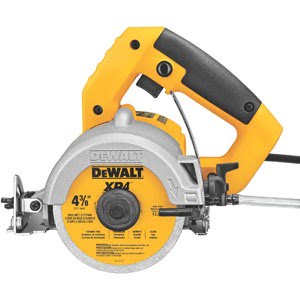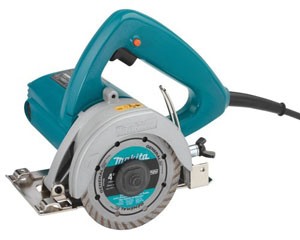When it’s time to install new ceramic tile or stone countertops, which tool do you trust? Is one tile cutter better than the other for granite, concrete, and porcelain? Let’s review these two masonry saws from DEWALT and Makita to see which one is best for your job.
DEWALT DWC860W 4-3/8-Inch Wet/Dry Masonry Saw

The DEWALT DWC860W can cut a range of materials, from cement board and concrete to marble, granite, and porcelain. And it makes a tough job easier because it cuts both wet and dry. Cutting wet keeps the blade and the masonry cooler, helping you get the work done faster.
Since it uses a 4-3/8-inch diameter blade, this masonry saw has a maximum vertical cutting depth of 1-3/8-inches. You can adjust the depth as well. And since the DWC860W bevels up to 45 degrees, you can cut at an angle. This feature may be essential when you need to fit materials flush with each other.
It comes with a diamond blade and a 12-foot-long water line, so it’s ready to use right out of the box. The water line includes a regulator that allows you to adjust the flow, too.
With a 10.8Amp motor, the DWC860W runs up to 13,000rpm for quick and smooth cuts in stone. It only weighs 6.6 pounds, making it very portable. For comparison, the Makita saw reviewed below weighs just a tiny bit less.
The rubbery handgrip includes a lock-on button to keep your hand from getting tired. And the power switch is sealed to protect it from dust, thereby avoiding a common point of failure in this kind of tool.
Owners have commented that this masonry saw and tile cutter makes quick work of slicing through cement board, tile, soapstone, marble, and granite. One of the most common phrases they use is “like a hot knife through butter.”
More features of the DEWALT DWC860W Wet/Dry Masonry Saw:
- Has a 90-day money-back satisfaction guarantee, 1-year free service, and 3-year limited warranty
- Comes with blade, wrenches, and water line with regulator
Makita 4100NH 12 Amp 4-3/8-Inch Dry Cut Masonry Saw

While the DEWALT DWC860W can cut wet or dry, the Makita 4100NH is limited to dry cuts only. But it’s both a tile cutter and masonry saw that can slice through a range of materials like ceramic tile, concrete, and other kinds of stone.
The 4100NH is similar to the DEWALT saw in that it uses a 4-3/8-inch blade and it has a maximum cutting depth of 1-3/8-inches. There is also a gauge for adjusting the depth.
The official Makita specifications state that the top speed is 14,500rpm with the 12Amp motor. But the blade doesn’t bevel for angled cuts like the DEWALT saw can.
Although the 4100NH weighs a little less than the DEWALT DWC860W, it lacks an important feature that prevents hand fatigue on big jobs. Instead of a lock-on button for the trigger, it has a lock-off switch for safety. At least you won’t be likely to start up the saw without meaning to do it.
There is no water line as this saw does not cut wet. But it comes with a diamond blade so you can get started cutting without making additional purchases.
More features of the Makita 4100NH Dry Cut Masonry Saw:
- Has a 30-day satisfaction guarantee and 1-year limited warranty
- Comes with diamond blade and wrenches
Recommendation
Your choice will probably come down to whether you need wet or dry cuts, and whether you want to perform bevel cuts, too.
There is one major difference between the Makita 4100NH and the DEWALT DWC860W. The Makita saw only cuts dry materials while the DEWALT cuts wet or dry. The advantage to cutting wet is that it keeps dust to a minimum and keeps the blade and material cooler. And some things like concrete are easier to cut wet. Meanwhile, dry cutting is advantageous when you’re working indoors and don’t want to deal with puddles of water.
Next, the DEWALT DWC860W can bevel up to 45 degrees while the Makita 4100NH cannot bevel at all. And finally, the DEWALT saw has a lock-on button, so you don’t need to depress the trigger the whole time. But the Makita has a lock-off switch to avoid unintentional startups.